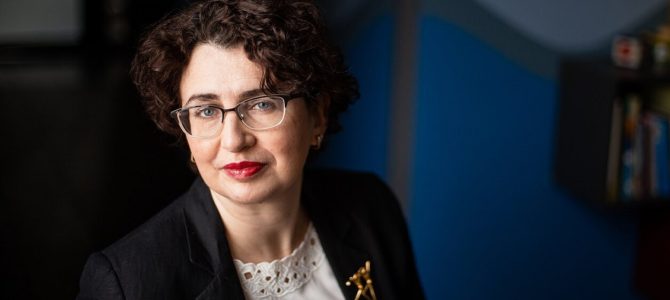Photo: Ruth Reches, by J. Stacevičius, courtesy LRT.lt
by Domantė Platūkytė
Life in the lion’s den, classmates as part of execution squads and concentration camps. These are aspects of Ruth Reches’s family life she shared with the LRT.lt website. Her grandmother after coming back from a concentration camp found the family home occupied. The new owners brought out a tub of water and let them spend the night on the ground in an adjacent shack. “What happened in Lithuania can’t be understood and explained rationally,” Reches said.
Reches, the principal of the Sholem Aleichem ORT Gymnasium and a doctor of psychology, gave an interview to LRT.lt and spoke about her grandparents surviving the Holocaust, the brutality of people and the impulse to aggression disinhibited by the war.
“When neighbors and classmates murder people… My grandfather’s mother was murdered by my grandfather’s brother’s classmates in Alytus. There are so many stories where teachers shot their students, and the town priest rang the bells so the shots wouldn’t be heard,” Reches, who has a published a book about the Holocaust and self-identity, said.
She said the experiences of the Holocaust haunted her grandparents their entire lives.
“The Holocaust left trauma in my grandparents’ lives because the environment to which they returned after the war was hostile and traumatizing. They returned to their hometowns and my grandparents saw their homes had been taken, and society wasn’t ready to accept them back. They felt no support from society, only anger that they had survivied,” Reches told LRT.
When the war began your grandparents were still children. Your grandmother Klara was imprisoned in a ghetto and later a concentration camp. Grandfather Samuelis was in Palanga then. Tell the story of your grandparents.
My grandfather came from Veisiejai. He was 11 when the war began. In the summer of 1941 my grandfather was at a children’s camp in Palanga. During the first days of the war the children were evacuated to orphanages in Russia, but my grandfather didn’t make it into that evacuation and remained with other Jewish children in Palanga, and was ordered to clean barracks, synagogues…
His parents had no news of him then. My grandfather’s brother said the neighbors then tried to escape, to make it into Russia, and suggested my grandfather’s family–his parents, brother and sister–flee as well. But they declined because the family was looking for my grandfather Samuelis.
There was no communications available so my grandfather’s mother learned just by word of mouth that he had ended up in a children’s home in Kaunas. She went to Kaunas and by some miracle found her son, and took him home.
Full interview in Lithuanian here.


